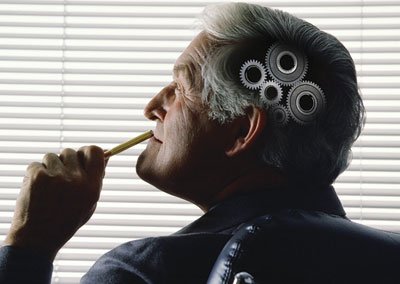Every 72 seconds, someone in America starts losing their
memories
– memories of childhood, of falling in love, of births and of
deaths – because of Alzheimer’s disease, according to the
Alzheimer’s Association. An estimated 5.1 million Americans have
the disease.
Every 72 seconds, someone in America starts losing their memories – memories of childhood, of falling in love, of births and of deaths – because of Alzheimer’s disease, according to the Alzheimer’s Association. An estimated 5.1 million Americans have the disease.
Though Alzheimer’s is the most common form of dementia, said David Severin, a neurophsychologist with Kaiser Permanente, most people will experience some level of natural memory loss that typically comes with old age.
“Just as our muscles tend to weaken in the natural aging process, our brains weaken a little,” he said. “So, our cognitive skills won’t be as strong as they would have been in, say, our 20s or 30s. But though there’s no cure for dementia, there are ways to ward it off a little longer.”
Studies have shown that memory exercises, which include everything from formalized classes on problem-solving to jigsaw puzzles and games, can improve cognitive abilities. Depending on the study, the benefits of these exercises have been shown to last anywhere from two to five years, according to the U.S. National Institute on Aging. There is no known way to prevent dementia entirely.
Live Oak Adult Day Care, which serves the South Valley, offers various games and classes for its seniors, including a creative writing class.
“We give our seniors a list of questions and ask them to write about their lives,” said Gloria King, assistant director of the program. “We ask them what they used to do, who they did it with, how they met their spouse, what they wanted to be when they grew up. It’s fascinating to read them afterwards, and it’s good incentive for (our seniors) to think and use their memories.
At the Gilroy Senior Center, about 40 seniors get together every Thursday morning to play bridge. Other seniors also play pinochle and pedro, an Italian card game, bingo or work a large jigsaw puzzle at the center, said Sandra Sammut, recreation supervisor at the center.
“All of these things help keep the mind sharp, but just walking in the door of the senior center helps,” she said. “The socialization aspect is wonderful for keeping the mind active. People talk with their peers, have a cup of coffee or a nutritious meal and that kind of interaction keeps them going.”
Hazel Hawkins Memorial Hospital in Hollister offers “Priority Passport” for seniors, where weekly speakers talk to groups about various topics. The hospital also has a senior mental health program that includes helping seniors find activities they would enjoy as well as provide a social atmosphere for seniors.
Because people are living longer and baby boomers are now getting to the age where dementia becomes a concern, the number of dementia patients continues to rise every year, Severin said. Big game companies, such as Nintendo, have caught on and begun marketing games specifically to an older audience, such as “Brain Age,” “Big Brain Academy” and “Tetris.” These video games involve basic math problems, memory quizzes, Sudoku puzzles, vocabulary tests and shape-fitting puzzles.
“There’s not a lot of hard scientific data on this yet, but there are a few studies and a lot of evidence that games, socializing, seemingly simple hobbies like bird watching – any mental stimulation – helps people’s memories,” Severin said. “It doesn’t matter what it is, as long as people keep their minds busy. The worst thing to hear is that a senior is bored. But a TV set or a radio isn’t enough stimulation. People need the back-and-forth.”
Physical activity has also been shown to help improve people’s memories. Several studies have shown exercising for 30 minutes a day has cognitive benefits as well as physical ones, according to the Mayo Clinic. Other studies have shown even just 15 minutes of physical activity a day is better for people’s memories compared to no activity at all.
“We have four senior aerobics classes going, and the seniors love it,” said Patricia Wyman, nutrition site manager for the Morgan Hill Senior Center. “The classes are huge – in fact, we have a better turnout for senior aerobics than any of our other aerobics classes.”
Live Oak Adult Day Care offers an adaptive physical education class and Gilroy Senior Center offers stretching classes and dance classes.
“There’s a line dancing class that meets on Fridays, and believe me, that keeps the body and mind in shape,” Sammut said. “They’re doing all those dance moves, and all the dances are memorized. I’ve tried it, and I can barely keep up.”
Physical activity helps keep people’s memories sharp because the brain is an organ, Severin said.
“What’s good for the heart is good for the brain,” he explained. “They’re both organs and they both need to be kept in shape.”
When trying to keep cognitive skills honed, one thing people should be wary of is over-the-counter supplements, Severin said. Most are not FDA controlled and some may interfere with other medications seniors are taking.
“It’s a personal choice to take supplements or not, but be very careful,” he said. “Talk to your doctor before starting to take anything over-the-counter and remember, there’s no such thing as a cure for dementia. The best we can do is work hard to put it off for as long as possible.”












